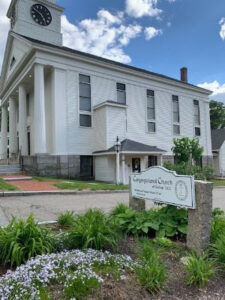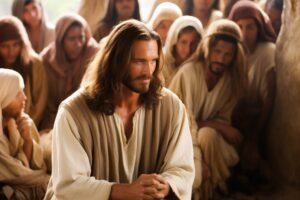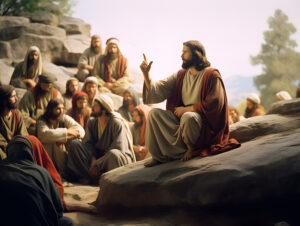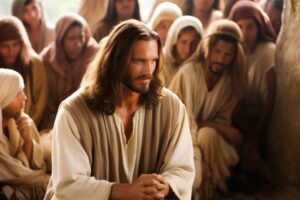Posted by Roberta Grimes • June 01, 2024 • 14 Comments
Jesus, The Teachings of Jesus
Day by day, Day by day,
Oh Dear Lord, Three things I pray.
To see thee more clearly, Love thee more dearly,
Follow thee more nearly, Day by day.
Oh… Day by day, Day by day,
Oh Dear Lord, Three things I pray.
To see thee more clearly, Love thee more dearly,
Follow thee more nearly, Day by day.
Day by day, Day by day,
Oh Dear Lord, Three things I pray.
To see thee more clearly, Love thee more dearly,
Follow thee more nearly, Day by day.
– Stephen Schwartz, from “Day by Day,” from “Godspell” (1971)
 For my whole life I have struggled to find ways to ever better understand what Jesus meant by all the things that He said two thousand years ago, when He taught on earth. Almost as soon as I was able to read such sophisticated language as is in the Bible, I was attempting to read the four Biblical Gospels in a little copy of just the Gospels that some Mormon missionaries had given to each of the children in my Congregational Church’s Sunday School. And even as a young child, almost every time that I attempted to read Jesus’s Gospel words, I seemed to be finding new shades of meanings in what He was saying there. So to deepen my perspective, by the age of eleven I had graduated to reading the whole Bible through, from Genesis right through Revelation, just a couple of pages every night. I wanted to see what added perspective all the rest of the Bible might add to what Jesus was saying to us in just His four Books. And then of course I went on to major in early Christian history in college.
For my whole life I have struggled to find ways to ever better understand what Jesus meant by all the things that He said two thousand years ago, when He taught on earth. Almost as soon as I was able to read such sophisticated language as is in the Bible, I was attempting to read the four Biblical Gospels in a little copy of just the Gospels that some Mormon missionaries had given to each of the children in my Congregational Church’s Sunday School. And even as a young child, almost every time that I attempted to read Jesus’s Gospel words, I seemed to be finding new shades of meanings in what He was saying there. So to deepen my perspective, by the age of eleven I had graduated to reading the whole Bible through, from Genesis right through Revelation, just a couple of pages every night. I wanted to see what added perspective all the rest of the Bible might add to what Jesus was saying to us in just His four Books. And then of course I went on to major in early Christian history in college.
 One of the things that I learned in college was that if I hoped to better understand my treasured Jesus’s deeper thoughts, I would have to deal with some additional complications. For one example, Jesus spoke Aramaic while He was on earth, but His teachings were first written down in Greek some sixty or so years after His resurrection. So that was their first language translation. And later on, of course, would come a second translation from Greek into Latin in the early Middle Ages. Then after additional centuries had passed would come yet more translations, into English and into other modern languages. And with each translation, additional fallible human translators had to make many decisions which might do at least some level of violence to what Jesus originally had said in the lyrical and emotional language that was His original Aramaic. The classic example often used to illustrate this problem is the Greek word “Metanoia”. What Jesus almost certainly first said in Aramaic, which then was translated into Greek as “Metanoia”, was “transform your mind.” But the early Medieval Christian monk who first saw that word “Metanoia” in Greek is known to have translated it into the Latin command that we must “repent”. And that is how the insistence that we all must “repent!” ended up as a command from Jesus throughout the first Latin translations of His spoken words. Even though it surely was nothing that Jesus said, nor was it anything that He ever would have said!
One of the things that I learned in college was that if I hoped to better understand my treasured Jesus’s deeper thoughts, I would have to deal with some additional complications. For one example, Jesus spoke Aramaic while He was on earth, but His teachings were first written down in Greek some sixty or so years after His resurrection. So that was their first language translation. And later on, of course, would come a second translation from Greek into Latin in the early Middle Ages. Then after additional centuries had passed would come yet more translations, into English and into other modern languages. And with each translation, additional fallible human translators had to make many decisions which might do at least some level of violence to what Jesus originally had said in the lyrical and emotional language that was His original Aramaic. The classic example often used to illustrate this problem is the Greek word “Metanoia”. What Jesus almost certainly first said in Aramaic, which then was translated into Greek as “Metanoia”, was “transform your mind.” But the early Medieval Christian monk who first saw that word “Metanoia” in Greek is known to have translated it into the Latin command that we must “repent”. And that is how the insistence that we all must “repent!” ended up as a command from Jesus throughout the first Latin translations of His spoken words. Even though it surely was nothing that Jesus said, nor was it anything that He ever would have said!
 But remember that by the Middle Ages, that monk who was Jesus’s first translator from Greek into Latin was a member of the Roman Emperor Constantine’s fear-based Christian religion, which is the Christianity that still prevails in the world today. That monk never knew the genuine Jesus, nor did he have any idea of what the genuine Jesus actually had taught. And the Christian religion of that Medieval monk who first translated the words of Jesus was built not around love, of course, but instead his Christianity was centered on the ancient Hebrew religious idea that Jesus had come to die as a pure sin-sacrifice to redeem us from God’s judgment for our sins. Jesus had been a sin-sacrifice without blemish. That whole pure sin-sacrifice idea had been a concept central to the religion of the ancient Hebrews, and it was well known to the Apostle Paul. It was familiar as well to the Councilors at the Council of Nicaea in the year 325 who had created Constantine’s Christian religion. The monk who did that first Latin translation therefore readily believed that the Jesus he was sure must have founded the Christianity that he devoutly followed later on would of course have ordered us all to “repent”!
But remember that by the Middle Ages, that monk who was Jesus’s first translator from Greek into Latin was a member of the Roman Emperor Constantine’s fear-based Christian religion, which is the Christianity that still prevails in the world today. That monk never knew the genuine Jesus, nor did he have any idea of what the genuine Jesus actually had taught. And the Christian religion of that Medieval monk who first translated the words of Jesus was built not around love, of course, but instead his Christianity was centered on the ancient Hebrew religious idea that Jesus had come to die as a pure sin-sacrifice to redeem us from God’s judgment for our sins. Jesus had been a sin-sacrifice without blemish. That whole pure sin-sacrifice idea had been a concept central to the religion of the ancient Hebrews, and it was well known to the Apostle Paul. It was familiar as well to the Councilors at the Council of Nicaea in the year 325 who had created Constantine’s Christian religion. The monk who did that first Latin translation therefore readily believed that the Jesus he was sure must have founded the Christianity that he devoutly followed later on would of course have ordered us all to “repent”!
 But Jesus was not the founder of what eventually became modern Christianity. What Jesus Himself created was “The Way,” which was the beautiful and simple love-based spiritual way of life that He taught to His disciples. The Way that Jesus gave us then grew rapidly for the first two hundred years after His death and resurrection, all around the Mediterranean Sea until it had amassed millions of followers as far away as Rome. And our great tragedy as we try to ever more deeply understand and draw closer to the true Jesus now is the unavoidable fact that human history always is written by its winners. The Romans decided that they probably could use The Way, as successful as it had been in gaining followers, but not in its original form. So they ruthlessly persecuted and crushed it, and they nearly wiped it out. By the early 300s, there was almost nothing left of Jesus’s original Way but its scriptures, which still had the name of Jesus attached to them when Constantine resurrected The Way in 312. It then was formalized as Roman Christianity at the First Council of Nicaea in the year 325 CE. By then, The Way had allowed all sorts of spiritual side-dogmas to develop; and in order for it to be useful to Rome, Constantine’s version of Christianity needed to be transformed from a spiritual movement into a fear-based religion that would make it an efficient means of mass human control. First Nicaea’s new version of Christianity was therefore built around a lesser dogma that had developed within The Way, which was that Jesus’s death on the cross had been a sin-offering required by God to cleanse us of our sins.
But Jesus was not the founder of what eventually became modern Christianity. What Jesus Himself created was “The Way,” which was the beautiful and simple love-based spiritual way of life that He taught to His disciples. The Way that Jesus gave us then grew rapidly for the first two hundred years after His death and resurrection, all around the Mediterranean Sea until it had amassed millions of followers as far away as Rome. And our great tragedy as we try to ever more deeply understand and draw closer to the true Jesus now is the unavoidable fact that human history always is written by its winners. The Romans decided that they probably could use The Way, as successful as it had been in gaining followers, but not in its original form. So they ruthlessly persecuted and crushed it, and they nearly wiped it out. By the early 300s, there was almost nothing left of Jesus’s original Way but its scriptures, which still had the name of Jesus attached to them when Constantine resurrected The Way in 312. It then was formalized as Roman Christianity at the First Council of Nicaea in the year 325 CE. By then, The Way had allowed all sorts of spiritual side-dogmas to develop; and in order for it to be useful to Rome, Constantine’s version of Christianity needed to be transformed from a spiritual movement into a fear-based religion that would make it an efficient means of mass human control. First Nicaea’s new version of Christianity was therefore built around a lesser dogma that had developed within The Way, which was that Jesus’s death on the cross had been a sin-offering required by God to cleanse us of our sins.
 Still, the core of Jesus’s teachings when He was on earth had not been focused on sin. And the Councilors who were creating this new religion of Christianity under Constantine’s direction, and were assembling their new religion’s sacred Book, held a sufficient reverence for the teachings of Jesus that fortunately they left nearly all of His teachings just as they had received them, and they put what they added in the course of building their new religion just at the back of each of their chosen four of the many accounts of Jesus’s words that were then in circulation. Thomas tells me that He and some of Jesus’s other followers not then in bodies were influencing the minds of many of the Councilors at First Nicaea, and at the six other first millennium councils. So they were able to shape to a considerable extent what happened at all of those councils, especially with regard to the selection and preservation of those four Biblical Gospels.
Still, the core of Jesus’s teachings when He was on earth had not been focused on sin. And the Councilors who were creating this new religion of Christianity under Constantine’s direction, and were assembling their new religion’s sacred Book, held a sufficient reverence for the teachings of Jesus that fortunately they left nearly all of His teachings just as they had received them, and they put what they added in the course of building their new religion just at the back of each of their chosen four of the many accounts of Jesus’s words that were then in circulation. Thomas tells me that He and some of Jesus’s other followers not then in bodies were influencing the minds of many of the Councilors at First Nicaea, and at the six other first millennium councils. So they were able to shape to a considerable extent what happened at all of those councils, especially with regard to the selection and preservation of those four Biblical Gospels.
 The way that the Christian Bible was assembled at First Nicaea with what we now know was spiritual guidance, and then carefully preserved thereafter, ensured that the precious words of Jesus would be largely preserved. Yes, there are some contradictions within the Gospels themselves as to what we are told that Jesus said, but those contradictions come largely from translation issues, from Christian dogma-based contradictions, from some First Nicaean Councilors’ additions, and from the frank fact that as they invented their religion, the Councilors never thought to check to see whether they were going against any of the spoken teachings of Jesus, who was the Prophet that they were claiming as their nominal founder. Here are examples of each of these problems:
The way that the Christian Bible was assembled at First Nicaea with what we now know was spiritual guidance, and then carefully preserved thereafter, ensured that the precious words of Jesus would be largely preserved. Yes, there are some contradictions within the Gospels themselves as to what we are told that Jesus said, but those contradictions come largely from translation issues, from Christian dogma-based contradictions, from some First Nicaean Councilors’ additions, and from the frank fact that as they invented their religion, the Councilors never thought to check to see whether they were going against any of the spoken teachings of Jesus, who was the Prophet that they were claiming as their nominal founder. Here are examples of each of these problems:
 Then too, of course, there is the plain fact that Jesus never was speaking in a vacuum. His Gospel words always were at least in part dependent on what was going on around Him, who He was addressing, and what the stage of His ministry was at that moment. This point is especially important! Jesus was always sensitive to His listeners, and He spoke very differently, for example, to clergymen, for whom He had little use, or when He spoke to poor widows, or to earnest young seekers, or to His closest disciples and friends. Modern Christians will often carelessly pluck a few of Jesus’s random words from the Gospels and cite them just in sentence-fragments, as if they were definitive proclamations. And if you do that, you might cause your listeners to misunderstand Jesus’s Mind pretty severely!
Then too, of course, there is the plain fact that Jesus never was speaking in a vacuum. His Gospel words always were at least in part dependent on what was going on around Him, who He was addressing, and what the stage of His ministry was at that moment. This point is especially important! Jesus was always sensitive to His listeners, and He spoke very differently, for example, to clergymen, for whom He had little use, or when He spoke to poor widows, or to earnest young seekers, or to His closest disciples and friends. Modern Christians will often carelessly pluck a few of Jesus’s random words from the Gospels and cite them just in sentence-fragments, as if they were definitive proclamations. And if you do that, you might cause your listeners to misunderstand Jesus’s Mind pretty severely!
 As the religion that the Roman Emperor Constantine created seventeen hundred years ago is falling apart around us now, it is fragmenting pretty severely. I recall that when The Fun of Dying was first published in 2010, I was astonished to learn that there were then some ten thousand denominations of Christianity in existence. And now, only fourteen years later, amazingly, there are more than forty-five thousand forms of Christianity extant worldwide, which is simply unbelievable. Yet still, we have our one patient and infinitely loving Jesus waiting for us! Amazingly, there is enough of Him for all of us to share. And Jesus has one clear message preserved for us in one set of four Biblical Gospels, still lovingly protected by Him, by my Thomas, and by the rest of Jesus’s faithful minions not now in earthly bodies. All the struggles of the past two thousand years are nearly altogether over. And Constantine’s Christianity is looking pretty hopeless to most of us at this point. So Jesus does ask one thing of us now. He hopes that we who love Him will try to begin to come together now, and resume The Way of Jesus again, my dear ones, if we possibly can?
As the religion that the Roman Emperor Constantine created seventeen hundred years ago is falling apart around us now, it is fragmenting pretty severely. I recall that when The Fun of Dying was first published in 2010, I was astonished to learn that there were then some ten thousand denominations of Christianity in existence. And now, only fourteen years later, amazingly, there are more than forty-five thousand forms of Christianity extant worldwide, which is simply unbelievable. Yet still, we have our one patient and infinitely loving Jesus waiting for us! Amazingly, there is enough of Him for all of us to share. And Jesus has one clear message preserved for us in one set of four Biblical Gospels, still lovingly protected by Him, by my Thomas, and by the rest of Jesus’s faithful minions not now in earthly bodies. All the struggles of the past two thousand years are nearly altogether over. And Constantine’s Christianity is looking pretty hopeless to most of us at this point. So Jesus does ask one thing of us now. He hopes that we who love Him will try to begin to come together now, and resume The Way of Jesus again, my dear ones, if we possibly can?
Day by day, Day by day,
Oh Dear Lord, Three things I pray.
To see thee more clearly, Love thee more dearly,
Follow thee more nearly, Day by day by day by day…
– Stephen Schwartz, from “Day by Day,” from “Godspell” (1971)
This has been life changing. I was brought up in a born again Christian family where I had fear of God drilled into me from childhood. Doing”bad” things would get me cast into a lake of fire for all eternity and it would be painful.The irony is that my family wasn’t particularly nice.They were very judgemental and narcissistic. I always wanted to believe in a kind Jesus. He feels like he might be the very first hippie just spreading love and compassion. Not the judgement that I was taught.
Oh my goodness, my ever so wonderful Joyce, I can clearly envision that being cast into a lake of fire for all eternity would be painful!! I am so sorry, my dear one, that this was your introduction to Jesus. How awful for you, and so completely untrue about him!! I do love, though, your characterization of Jesus as something like the very first hippie. Actually, I was of that generation, and I guess that I can’t quite characterize Him that way because He has clearer moral standards than they did. But He is a strong avatar of perfect love, for certain!
Hi Roberta,
I love it when you write about the real reason that Jesus came and what he was trying to teach. It’s wonderful to have Jesus in your life without any guilt or judgment, other than what you feel inside and can process and let go of.
Being from a Christian family, so many times I have stopped to ask wait a minute, Father God and Jesus God seem so far apart int heir messages. But then you begin to see how mankind has meddled with the truth to meet their own objectives. The message Jesus taught of love and forgiveness is clear, and mankind can be good and do good without the fear of Satan and a fiery hell.
Oh yes indeed, my dear wonderful Timothy! And we haven’t talked much about God here, which of course is my fault. At Thomas’s insistence, we are going to try to remedy some of this coming week….
It’s terrible how they used Jesus to support their own agenda. This is why Jesus did not want religion. He knew how dangerous it could become, and it did. The many mistakes and deliberate changes that came about from being translated into many languages made things even worse.
Ah yes, my lovely Lola, beautifully and very succinctly said. Jesus most assuredly trusted neither religions nor the clergy who lived off them!
Dear Roberta, Thank you for this splendid analysis. Withought knowing the facts of translation errors as you have cited them, your conclusions are what I always surmised.
I am surely close to finishing up here, and have tried to convey my sentiments to family in short poems. Here is my latest, and possibly last:
Finishing
Lying here
Waiting on the last, final act
Did I do enough?
Never enough
Forever to regret
Insulted I hit back
Did I do too much?
What gained from hurting?
Unending ripples retaliating
I did too much of that
Forever to regret.
So little time left
What’s left now?
What good can be done?
Act now, or
Forever regret
Oh, time’s over now
Time’s up
Time to return Home
Where there is no time
Hi Jack!
I can’t tell you in words how much you have helped me in this journey. I really appreciate you and everything you’ve done for us.
That is a wonderful poem. I hope you and the rest of us let go of any regrets. I’ve come to believe that all of my past behavior that I wish I could take back were part of this journey. Something I had to experience in order to grow. I now accept when a feeling pops up and try to let it pass knowing this is part of the process.
I hope we all get to meet up when we return home and have a laugh at how crazy this place is. 🙂
Love ya brother,
Thomas
Oh my sweet beloved Thomas, in the end, yes truly, love is all there is. Life breaks you open, it hollows you out, and then it fills you up with nothing else but love, which is all that remains.
Oh my dear so wonderful Jack, I have read you beautiful poem repeatedly this week, and it brings tears to my eyes. Please know that your family of friends here love you and will miss you very much when you go home, my dear one! But I understand the words, dear Jack. And no need to regret. You have done so much good for us all! So much wisdom, and so much kindness. We each are helping one another, day by day, and ultimately it is only love that matters.
Dear Thomas,
Thank you immensely. My expiration date must surely have passed, so I have been wondering why I’m left to linger; your comment may hold the answer.
We are all here for each other, both as perishable mortals and most especially as immortal spirit. We will all dance together over our mortal hardships, without end, in the loving presence of God.
Oh my sweet beloved Jack, this is so beautiful! Ah yes, we all will dance together then, forever young and glorious and love everlasting!
I just love to hear from you on this subject. I was born a Jew and followed the religion while I was very young, but began to veer away from it eventually. Then I tried Christianity while I was in high school. There again, I found myself veering away from organized religion as it seemed to paint God as angry and judgmental. This never made sense to me. It is only after discovering your website, that all of it became clear to me. Thank you. In my religious travels through life, I always wanted to know what it would be like to have a relationship with Jesus, to know of what he was trying to teach us and to love him as I love our Creator.
I am no expert in any religion, and would like to know where I can find the closest interpretation of Jesus’ teachings. You always relate to the four Gospels. Is there some edition out there that provides that interpretation? Thank you so much for writing about this very important subject.
Oh my dear Scott, you are right in discerning that God and Jesus are genuine, but the religions are all human-made, and very poorly made at that! You might try teachingsbyjesus.com. We are just beginning to flesh out that website, and will be doing a lot more with it later. And you can email me at info@robertagrimes.com, if you like!